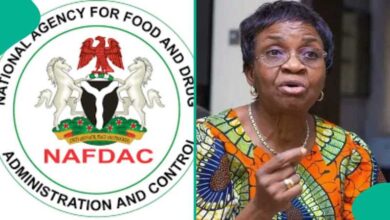Solution To Iron Deficiency Is Within Us – Experts

Osagie Ehanire, Minister of Health
Experts said the solution to iron deficiency anaemia and malnutrition is within our local environment even as they have suggested the consumption of locally available iron-rich food as an immediate solution to the problem.
Iron deficiency is a stage in which there is inadequate iron to maintain normal physiological function. It is essential to know that iron is the gold of normal human physiology. Without iron, human system cannot function well. Every cell in the body contains iron; it serves to excite human enzyme.
It works to facilitate the function of hormones. There are hardly any physiological functions in which iron is not involved
Experts said the consumption of locally available iron-rich and iron-fortified foods will provide the body system with the needed nutrient that the body needs to function effectively.
They also called for a multi-sectoral partnership approach involving the participation of all the stakeholders, including the companies, the government, and the people and ensuring proper regulation of the product for a sustainable fight against malnutrition.
Iron-rich food readily available within our immediate communities in Nigeria includes pumpkin leaves (Ugwu), ewedu, coco-yam leaves, Zoboleaves, Moringa leaves, soya beans, egusi (Mellon), Tatachi, crayfish, beans, palm nuts, carrot, maise, eggs, coconut, sweet potatoes, plantains, oranges, pear, apple, cashew nuts, fish, meat, amongst others.
Experts’ suggestions were in reaction to the alarming prevalence of Iron Deficiency in Nigeria as contained in the Nigeria Demographic Health Survey (NDHS) 2018, which showed that 68% of children 6–59 months of age and 58% of women of reproductive age in Nigeria are anaemic, with at least 30% of the anaemias attributable to iron deficiency.
Experts also suggested that improving child nutrition is critical, noting that this needs a multi-sectoral approach and collaboration from stakeholders in the public and private sectors.
Because childhood malnutrition links to multidimensional poverty, interventions to address malnutrition must be multidimensional. They must address various deprivations experienced by the Nigerian people. Therefore, a commitment from the government at all levels (federal, state and local) is crucial in improving child health in Nigeria.
At the individual level, nutrition-based interventions to improve child malnutrition should include educating mothers and fathers about the need to breastfeed infants within the first hour of life; exclusive breastfeeding in the first six months of life; introducing appropriate complementary food accompanying breast milk after six months of age; appropriate diet diversity and administering iron and vitamin A supplements.
At the household level, ensuring good water, sanitation, and hygiene practice could help reduce infections which result in child malnutrition. While at the community level, she said distributing supplementary food such as lipid-based nutrient supplements and fortified cereal products can be of great importance.
“There should also be support in food or cash transfers to allow households to buy their food,” she suggested.
The Director Department of Nutrition for Health and Development at the World Health Organization (WHO), Dr Francesco Branca, speaking at the 2019 World Food Day, called on the government of various nations to do more to ensure people have enough to eat and access the right foods.
“Cheap food tends not to be healthy food; we need government policies that make healthy food more available and affordable. We need to see changes in the public sector so that government organisations lead by example and purchase the right food.”
He added that health education and investment in supplier research would be crucial over the next five years. “One of the biggest barriers is the availability of the right food, which the large producers still dictate. We need to find a way of engaging with the food industry to change the content of food products. In some countries, people cannot meet a desire to eat the right food because of the choice of food available at the supermarket and its price.”
Testifying the efficacy of our local iron-rich foods, Dr Megor Ikuenobe, who shared her experiences on how she benefitted from eating the local delicacies said when she was pregnant for her fourth child and she couldn’t take an iron supplement that she had to be deliberate on her diets by taking local foods, adding that ‘zobo’ leaves are rich in iron.
According to her, “I found myself when I was pregnant with my fourth child after the first three when I thought that I was done. One of the things I found was that this time, I couldn’t take those supplements. I tried different types it was not working for me. And I said what else can I do, I went for an experiment with my Doctor and she told me you are a victim of fourth child syndrome. I saw a study that showed that our zobo leaves also contain iron. I was eating all kinds of vegetables and all of that, I tell you, my medical colleagues, in the house, during my second trimester my Packed Cell Volume (PVC) rose to 40% and I was very happy.
Packed Cell Volume (PCV) is a measurement of the proportion of blood that is made up of cells. The value is expressed as a percentage or fraction of cells in the blood. For example, a PCV of 40% means that there are 40 millilitres of cells in 100 millilitres of blood. When we go to the hospital to do a blood test, one of the standard blood tests is to first determine PVC which helps to know how anaemic a patient is and if such patient would require a blood transfusion, what type and how much or just blood supplements.
I never knew that will be possible without iron supplements. It was the first time that I was doing it. Please I am not advocating that we should not take our drugs, but if you find yourself in my shoes, this tells you that there is something you can do, these foods are readily available, all around you, they really work and they are cheap.
Dr Binyerem Ukaire, Director and Head, Nutrition Department, Federal Ministry of Health who represented the Minister for Health, Dr Osagie Ehanire, in her presentation titled “National Perspective on Iron Deficiency” emphasized the need for consumption of iron-rich local foods.
While giving insights into the causes of iron deficiency, she also explained the consequences of the problems, and what the government is doing in terms of policy and programmes, interventions and recommendations.
In her word, “We know that most of the health problems such as the iron deficiency are due to ignorance as it has been showcased today. People are not aware that many of these natural sources – be it animal or plant have health benefits and these foods are within the reach of the common Nigerians.
According to her, “Nigerian is blessed with enough natural sources of iron that can take care of her population if the people are properly educated on nutrition contents and benefits from those plants and animals available within our communities.
“Adequate nutrition is very key. When we say adequate nutrition that is what will make all Nigerians be well-nourished because we believe that adequate nutrition is the bedrock for good health, for achieving all the sustainable global development goals. Adequate nutrition is the bedrock for physical growth and development, in the child and even later on for productivity and also for economic growth. When we talk about adequate nutrition, we are talking about the quantity, the quality of what is being consumed with respect to micronutrients – your fat, your carbohydrate etc.
“Micronutrients are those ones that are not seen and that is where iron belongs to – Iodine and vitamin A, Folic Acid etc are always given as supplements. When one is deficient and is not known, it is called hidden hunger. Sometimes it’s not obvious to everyone but they are there silently causing harm,” she explained.
Dr Ukaire stated that malnutrition usually presents itself either as undernutrition in the form of wasting or stunting.
She explained that a wasted child’s weight is always too low compared to his/her height while in stunting; the height of a stunted child is always too small compared to the age.
On obesity, she expressed surprise that some people do not know that overweight and obesity are also forms of malnutrition on the other side of the scale.
She hinted that malnutrition is the underlying cause of approximately 50% of the under-five mortality globally.
“We are gathered here today because iron is very crucial. When you say haemoglobin you refer to iron. Iron is very vital for the synthesis of haemoglobin in the red blood cell and we all know that blood is life.
The launch of Live Strong with Iron In 2021 by Nestle was a practical demonstration of its avowed commitment to providing good food and ensuring good life and health for all Nigerians.
The Corporate Communication and Public Affairs Manager, Nestle Nigeria, Mrs Victoria Uwadoka, represented the Managing Director/Chief Executive Officer, Wassim El-Husseini at the launch of Live Strong with Iron by Nestle in Abuja and spoke on the benefits and importance of eating iron-rich food, especially the local sources.
According to her, we have many local sources of iron-rich foods. Many people are unaware of their nutritional values.
Live Strong With Iron campaign aims to create awareness, educate the public and draw their attention to the inherent benefits of eating our local iron-rich food and iron-fortified foods.
“We have all these readily available but do the people know that they contain iron. Do they know how to combine it? Do they know how to eat it? Do they know whether their body is absorbing it or not? We need stakeholders’ action to frame this problem, call for a solution, and help our people make the right nutrition choices. So by this time next year, if we were to conduct a survey, the metric should be so much better, which is what we are looking forward to,” she explained.




